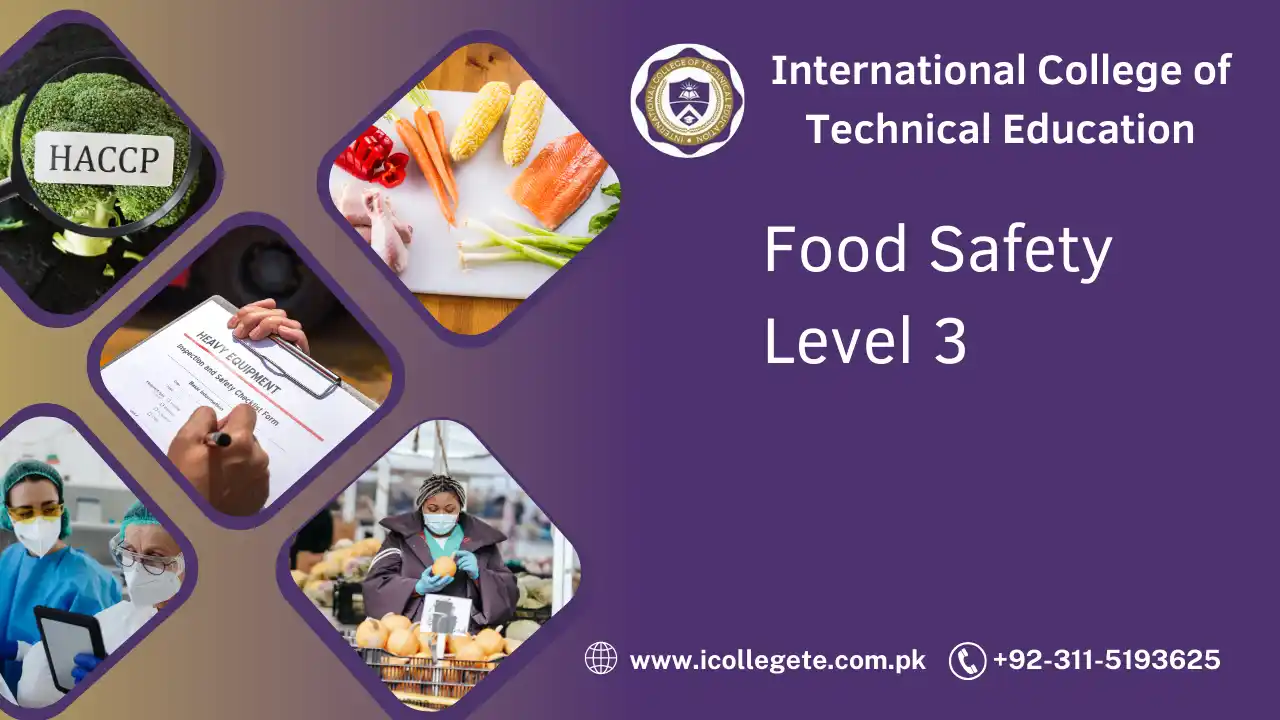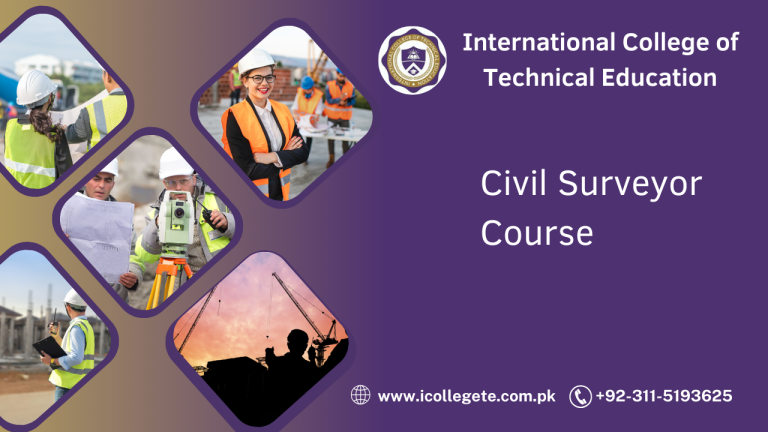Food safety is paramount in ensuring that the food served to consumers is safe to eat. As the food industry continues to evolve, the need for highly skilled professionals who can manage food safety systems effectively is growing. The Food Safety Level 3 Course is designed for those who wish to advance their knowledge and skills in food safety management, enabling them to take on supervisory or managerial roles within food-related industries.
The Food Safety Level 3 Course is an advanced qualification that focuses on food safety management and leadership within food businesses. It’s intended for those who are responsible for supervising food safety and managing food safety systems. This course takes a deeper dive into food safety management, focusing on risk assessment, hazard control, and the development of food safety procedures.
Whether you’re a food safety manager, supervisor, or owner of a food business, this course will provide you with the tools to improve food safety practices, reduce risks, and ensure compliance with both local and international food safety regulations. Upon completion, participants will be ready to assume leadership roles in managing food safety systems and ensuring that food establishments maintain high hygiene standards.
Course Overview
The Food Safety Level 3 Course is structured to provide a comprehensive understanding of food safety systems, including the identification and management of risks, development of food safety policies, and implementation of best practices in food handling. This course emphasizes the importance of food safety at all levels of food production, from handling raw materials to serving food to consumers.
Designed for experienced food handlers, supervisors, and managers, the course covers topics such as managing food safety risks, implementing effective food safety procedures, and ensuring compliance with food safety laws. The course aims to equip individuals with the skills needed to lead and maintain food safety systems, while also promoting a culture of safety within food establishments.
Study Units
The Food Safety Level 3 Course consists of the following key study units:
- Food Safety Legislation and Regulations: This unit explores the relevant food safety laws and regulations, both local and international. Participants will learn how to ensure compliance with food safety standards and understand the legal requirements for food safety management.
- Managing Food Safety Risks: This unit covers risk assessment methodologies and the identification of potential hazards in food handling. Participants will learn how to assess and mitigate risks to ensure that food is safe for consumption.
- Food Safety Management Systems (FSMS): Participants will gain an in-depth understanding of Food Safety Management Systems, including how to implement, monitor, and evaluate these systems to ensure effective food safety practices.
- HACCP (Hazard Analysis and Critical Control Points): A significant focus of the course, this unit covers the principles of HACCP, a widely recognized system for identifying and controlling food safety hazards. Participants will learn how to apply HACCP principles to manage food safety in their workplace.
- Food Safety Audits and Inspections: This unit provides guidance on how to conduct food safety audits and inspections. Participants will learn how to assess food safety practices within a business and identify areas for improvement.
- Training and Leadership in Food Safety: This unit covers the importance of training staff in food safety practices and fostering a culture of food safety within the workplace. It also provides leadership strategies for managing food safety teams effectively.
- Emergency Procedures and Crisis Management: In the event of a food safety incident, it is crucial to have effective crisis management procedures in place. This unit teaches participants how to develop and implement emergency procedures to address food safety crises.
- Developing Food Safety Policies: This unit guides participants in developing comprehensive food safety policies and procedures, ensuring that all aspects of food safety are effectively managed within an organization.
Learning Outcomes
By the end of the Food Safety Level 3 Course, participants will:
- Have a comprehensive understanding of food safety legislation and regulations, including local and international requirements.
- Be able to conduct food safety risk assessments and implement control measures to manage hazards.
- Understand the principles and applications of HACCP and other food safety management systems.
- Be able to develop, implement, and monitor food safety management systems within a food establishment.
- Understand how to conduct food safety audits and inspections to ensure compliance with safety standards.
- Have the skills to train staff in food safety practices and manage a food safety team effectively.
- Be prepared to develop food safety policies and emergency procedures for handling food safety incidents.
- Be capable of leading food safety initiatives, promoting a culture of safety and hygiene within the workplace.
Course Benefits
The Food Safety Level 3 Course offers several key benefits for participants and organizations:
- Advanced Food Safety Knowledge: This course offers in-depth knowledge of food safety management and risk control, which is essential for those in supervisory or management positions within the food industry.
- Career Advancement: Completing the Food Safety Level 3 Course opens up greater career opportunities in food safety management, including positions such as food safety manager, supervisor, and compliance officer.
- Improved Food Safety Standards: Participants will be equipped to manage and implement food safety systems that reduce the risk of foodborne illnesses and ensure consumer safety.
- Regulatory Compliance: The course ensures that participants understand and can implement food safety regulations, helping businesses stay compliant with local laws and international standards.
- Increased Consumer Trust: By ensuring that food safety practices are in place and adhered to, businesses can improve their reputation and build consumer trust in the safety of their food products.
- Practical Leadership Skills: The course provides leadership training to help participants manage food safety teams and ensure that food safety procedures are implemented effectively throughout the organization.
- Cost Reduction: Proper food safety management helps prevent costly incidents related to foodborne illnesses, fines for non-compliance, and damage to the business’s reputation.
Who Is This Course For?
The Food Safety Level 3 Course is ideal for:
- Food Safety Managers and Supervisors: Individuals already in supervisory or management roles within food-related businesses who want to enhance their skills in food safety management and ensure compliance with regulations.
- Owners and Operators of Food Businesses: Food business owners who wish to develop a comprehensive food safety system within their establishments.
- Food Safety Consultants: Professionals who provide food safety advice to food-related businesses and want to improve their expertise in food safety management systems.
- Quality Control Managers: Individuals responsible for overseeing the quality and safety of food products within a food manufacturing or processing environment.
- Catering and Restaurant Managers: Managers in the catering and hospitality industries who want to implement and oversee effective food safety management systems in their businesses.
- Anyone Aspiring to a Leadership Role in Food Safety: Individuals looking to take on leadership roles in food safety management or consulting within the food industry.
Future Progression
Upon completing the Food Safety Level 3 Course, participants can further advance their careers by pursuing additional qualifications or certifications:
- Food Safety Level 4 Course: For those looking to take on even more senior roles in food safety management, the Level 4 course offers in-depth knowledge of food safety systems and provides expertise in auditing and managing large-scale food safety operations.
- HACCP Certification: For individuals seeking to specialize in hazard control, obtaining an advanced HACCP certification will deepen their understanding of risk assessment and critical control points in food safety management.
- ISO 22000 Certification: This is an international standard for food safety management systems, suitable for those who wish to develop and implement food safety systems based on global standards.
- Food Safety Auditing: Those interested in food safety auditing can pursue certification in food safety audits, enabling them to conduct internal and external food safety audits in food businesses.
- Health and Safety Management Qualifications: Expanding into broader health and safety roles, participants can take certifications in occupational health and safety management, which can help them manage workplace health risks across industries.
- Consulting and Training Roles: With further experience, graduates can move into food safety consulting or training roles, advising businesses on best practices for food safety and hygiene
The Food Safety Level 3 Course in Lahore provides advanced knowledge and skills that are essential for anyone in a leadership position within the food industry. Whether you are a food safety manager, supervisor, or food business owner, this course equips you with the tools needed to implement effective food safety systems, reduce risks, and ensure compliance with food safety regulations.
By completing this course, you will not only improve food safety standards within your organization but also open up greater career opportunities in food safety management. This course is an essential step for anyone looking to lead and innovate in the food safety sector and create safer food environments for consumers.







